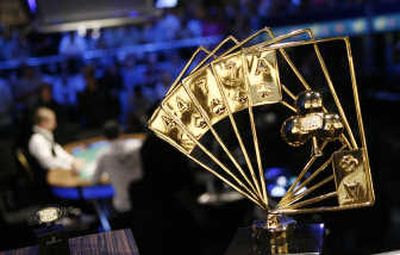Agents, sponsors now roam today’s poker tourneys

LAS VEGAS – Rounders and dreamers, stars and unknowns – they’re all converging on Las Vegas this week to try to turn a chunk of cash into a huge windfall and earn a permanent spot in poker lore during the world’s biggest card game.
Main event winners at the World Series of Poker used to win some money, a gold bracelet and the respect of a relatively small group of players who made a living on the green felt. But the series has come a long way from its Glitter Gulch roots in 1970, when casino owner Benny Binion packed 30 gamblers around a few tables downtown and had them vote for a winner after a few days of playing high stakes poker.
Today, agents roam the convention hall of the Rio All-Suite Hotel & Casino off the Las Vegas Strip to scout talent and sign deals at the 39th World Series of Poker. Sponsors dole out branded ball caps and polo shirts, offering bonus money when players get deeper into tournaments and their logos get more TV time. Harrah’s Entertainment Inc., the world’s largest casino company by revenue, got the series when it bought Binion’s Horseshoe hotel-casino in 2004.
Players now have 55 events in which to chase big money, compared with five in 1971.
The heart of the poker series – the main event – has been the same since the third series in 1972. The game: no-limit Texas Hold ‘em. The stakes: $10,000 per player. The prize: millions of dollars and the title of World Series of Poker champion.
Last year, California psychologist Jerry Yang beat out 6,357 others to take home the $8.25 million top prize.
Organizers expect thousands of players to pack the air-conditioned Rio over 11 summer days again this year, creating a field so large that the first session of action must be spread over four days. The field will be whittled to nine by July 15. About 10 percent of those who enter will win money.
But who wins the crown won’t be decided until November.
This year, tournament officials are gambling that delaying the tournament’s final table moments will generate four months of hype, a bump in the ratings and certain fame for the players that remain.
“This is probably going to be a watershed moment for poker,” said series commissioner Jeffrey Pollack.
Pollack, a former NASCAR vice president, says his goal is to help the tournament build a reputation for poker similar to other mainstream sports leagues. To do that, he says, poker needs to excite fans.
“We’ve been very forthright in that ambition,” Pollack said. “Change doesn’t happen overnight but a change in intention can happen overnight and our intention here is to help more people experience our thrills and excitement.”
Previously, casual fans of poker might have gotten word of the main event winner well before the tape-delayed event aired on ESPN in the fall. This year the network telecast will air hours after someone cashes in.
“This will be poker’s biggest night,” Pollack said.
Some of the players who give poker its face are far from convinced, wondering whether the benefits are worth changing structure mid-tournament.
“It’s a media thing and it’s great for media. As far as the game goes, not so great as far as the actual play,” said Chris Moneymaker, the 32-year-old former accountant who won the main event in 2003 after qualifying through a $39 online satellite tournament.
ESPN ramped up its coverage of the tournament in 2003 with pocket cams and player profiles, which combined with Moneymaker’s storybook win helped usher in the poker boom.
Taking poker further has inherent risks.
“What if someone dies?” said 2004 champion Greg Raymer.
World Series of Poker media director Nolan Dalla said that if anyone is absent from the final table, the player’s chips will be blinded and anted as if the player were there, folding each hand, until eliminated.
In 1990, Dalla said, Stu “The Kid” Ungar built up a huge chip stack but couldn’t finish the tournament because he overdosed on illegal drugs. His stack lasted until he finished in ninth place.
Another worry is the possibility that two final table players could make a handshake deal and collude when they come back.
“Many of the potential problems are pretty unlikely, but they exist, and they could all be avoided by doing the final table right away,” Raymer said.
More likely are questions of how play will be affected. What will the break do to the players’ momentum? Will unknown amateurs come back four months later the same player?
“From a competitive standpoint, there’s no question amateurs have a huge advantage, huge based on the delay,” said Daniel Negreanu, a four-time bracelet winner.
“If I make the final table, they have a library of hands that they can look up on me on YouTube, just tons of footage that they can study,” he said.
Negreanu said players would likely hire coaches for a percentage of their final winnings – he’s for hire if he’s no longer playing – and come back to the final table a totally different player.
But, Negreanu said: “From a buzz standpoint, it’s a no-brainer.”
Many believe the tournament needs a shot in the arm after main event participation decreased last year, dropping the top prize from a record $12 million in 2006 to $8.23 million. There were 6,358 players who entered, down from 8,773 the year before. Organizers said they don’t yet know how big this year’s field will be, and they expect many last-minute signups.
A combined $111 million was up for grabs through 51 World Series of Poker events this year, with professional poker players winning roughly seven of every 10. Nine of the events, including the main event, cost $10,000 to enter. One tournament, the rotating game H.O.R.S.E. event, cost $50,000 to play.